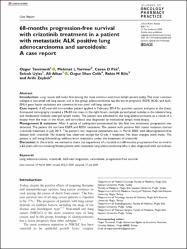68-months progression-free survival with crizotinib treatment in a patient with metastatic ALK positive lung adenocarcinoma and sarcoidosis: A case report

Göster/
Tarih
2020Yazar
Tanrıverdi, ÖzgürTarımer, Mehmet L.
Pak, Ceren D.
Uylaş, Selcuk
Alkan, Ali
Çelik, Özgur İlhan
Zeybek, Arife
Kılıç, Rabia M.
Üst veri
Tüm öğe kaydını gösterÖzet
Introduction Lung cancer still ranks first among the most common and most lethal cancers today. The most common subtype is non-small cell lung cancer, and in this group, adenocarcinoma has the worst prognosis. EGFR, ROS1 and ALK-EML4 gene fusion mutations are common in non-small cell lung cancer. Case report A 62-year-old non-smoker patient applied in February 2014 for purulent sputum and pain in the chest. Computed tomography revealed a 39x33 mm mass in the right hilum, multiple parenchymal nodules in the bilateral lung and mediastinal multiple enlarged lymph nodes. The patient was admitted to the lung adenocarcinoma as a result of a biopsy from the mass in the hilum, and sarcoidosis was diagnosed by mediastinal lymph node biopsy. Management & outcome After 4 cycles of carboplatin-pemetrexed for the first line treatment, progression was detected. The patient did not have EGFR and ROS1 mutations. The patient with positive ALK fusion mutation started crizotinib treatment in July 2014. The patient's last response assessment was in March 2020, with 68-progression-free disease with crizotinib. No toxicity was observed except for Grade 1 weakness. No dose changes were made. The patient is still being followed up without brain metastasis under the treatment of crizotinib. Discussion In this article, we wanted to share our experience of crizotinib in a 68-months progression-free survival in a 62-years old non-smoking female patient with metastatic lung adenocarcinoma who is also diagnosed with sarcoidosis.

















